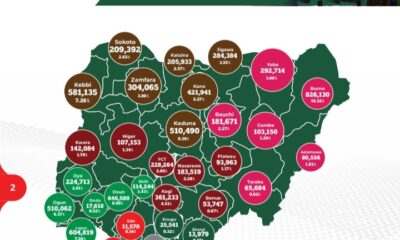Business
Petrol Price War: Six Depots Slash Prices Amidst Growing Competition

By Tayo Busayo, Abuja
DAILY COURIER – In a significant shift that could provide much-needed relief to consumers, six major petroleum depot operators have slashed the prices of Premium Motor Spirit (PMS), also known as petrol, as competitive pressure intensifies in Nigeria’s downstream sector.
The depot operators — Emadeb, First Royal, MENJ, Aiteo, Pinnacle, and Hyde Energy — announced new price reductions on Tuesday, June 3, a move that signals a potential market-wide trend toward lower pump prices.
According to verified industry data from Petroleumprice.ng, Emadeb reduced its depot price to ₦827 per litre from the previous ₦903. First Royal followed suit, cutting its price from ₦828 to ₦826 per litre. MENJ and Aiteo also reviewed their prices downwards, bringing them to ₦826 and ₦825 per litre respectively. Pinnacle brought its rate down from ₦856 to ₦850 per litre, while Hyde Energy made a marginal reduction from ₦869 to ₦868 per litre.
MORE STORIES: https://dailycourier.com.ng/press-release-fg-seeks-strategic-support-with-un-habitat-on-national-urban-development-policy/
The price cuts reflect a broader response to dwindling global crude oil prices currently hovering around $65 per barrel and increasing supply chain competition, especially following Nigeria’s renewed push for local refining.
An industry insider who spoke anonymously told Daily Courier that market watchers are now anticipating another round of price cuts — possibly from the Dangote Petroleum Refinery, which has served as a price anchor in the local market since it began commercial supply. “With depot prices aligning closely with Dangote’s ₦825/litre gantry price, it’s likely that Dangote will respond soon with further reductions to maintain its edge,” the source said.
Commenting on the development, the National President of the Petroleum Products Retail Outlets Owners Association of Nigeria (PETROAN), Dr. Billy Gillis-Harry, said the adjustments are part of a natural economic response to supply and demand forces. “These depot owners brought in petrol at commercial quantities. Without aligning with market realities, they risk being unable to offload the stock. But while we expect further reductions, we must ensure that competition does not become destructive. What we need is healthy competition that improves consumer welfare without endangering sector sustainability,” he cautioned.
Meanwhile, the Dangote Petroleum Refinery & Petrochemicals reaffirmed its commitment to stable pricing despite volatility in the global crude market. In a statement issued by Anthony Chiejina, the Group Chief Branding and Communications Officer, the company noted: “Our decision to maintain price stability reflects our unwavering commitment to support the Nigerian economy and to alleviate the burden on consumers.”
The refinery, which is Africa’s largest, has in recent months emerged as a key force in reshaping Nigeria’s fuel pricing landscape by offering products at relatively steady prices, prompting both local and international suppliers to rethink their pricing strategies.
https://dailycourierng.blogspot.com/2025/03/first-lady-oluremi-tinubu-expands-rhi.html
With ongoing shifts in global oil dynamics, evolving regulatory policies, and increasing local refining capacity, analysts believe Nigeria’s downstream oil sector may be entering a new era of price liberalization — one driven by competition, transparency, and increased private-sector participation.
For consumers, the immediate outcome is promising: cheaper fuel may soon become the norm rather than the exception. But for operators, especially independent marketers, the road ahead demands efficiency, collaboration, and innovation — lest they be priced out in a rapidly changing market.


















